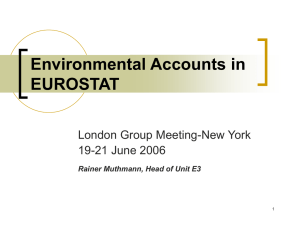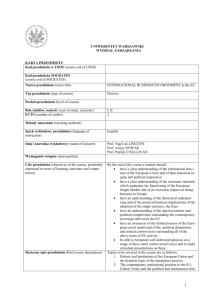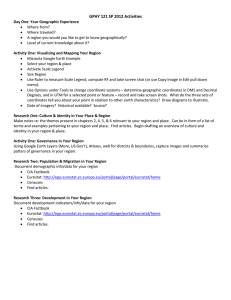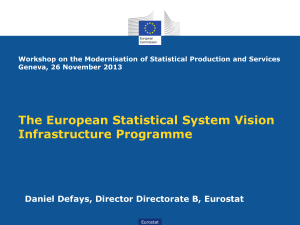International Seminar on Modernizing Official Statistics:
advertisement
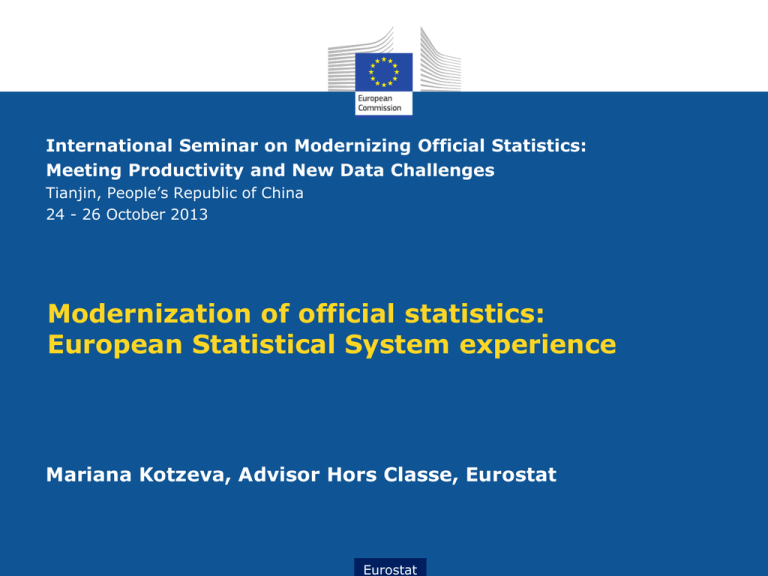
International Seminar on Modernizing Official Statistics: Meeting Productivity and New Data Challenges Tianjin, People’s Republic of China 24 - 26 October 2013 Modernization of official statistics: European Statistical System experience Mariana Kotzeva, Advisor Hors Classe, Eurostat ESTAT Eurostat This presentation : • Describes the ESS vision for modernizing EU statistical production; • Shares the results achieved and lessons learned so far; • Outlines challenges ahead and next steps in the implementation of the Vision. All that having in mind the specificity of the ESS construction: modernisation in the supranational context of the EU. modernisation as in any other production system of statistics. Mariana Kotzeva, Eurostat ESTAT Eurostat Background: • The Communication of the European Commission 2009 (404): introduces the Vision calling for efficiency gains through standardisation and industrialisation of statistical production; • A number of internal Eurostat Vision Implementation Projects (VIPs) and ESSnets (collaborative projects with Members States) were launched to implement the Vision; • The ESS.VIP Programme, started in 2012, consolidates the efforts and focuses on a limited number of projects to achieve efficiency gains in the production of European statistics; • The European Statistical Programme 2013-2017 includes concrete actions and projects for Vision implementation. Mariana Kotzeva, Eurostat ESTAT Eurostat Modernization of EU statistical production: from pre to post-industrialisation. Mariana Kotzeva, Eurostat ESTAT Eurostat Industrialisation ? Multiple sources Data integration Mariana Kotzeva, Eurostat ESTAT Eurostat Multiple purposes Modernisation of Statistics includes also: • Change in the set of products and services; • Change in the organisation and management of the statistical production; • Adjustment of the quality framework; • Implementation of technical and statistical standards; • Making up the HR strategy an integral part of the modernisation strategy. Mariana Kotzeva, Eurostat ESTAT Eurostat Census 2011: Example of a modern design of statistical production • Combines different sources: administrative registers, geographical data, sample survey data; • Employs mixed mode data collection (CAWI, CATI); • Uses output quality orientation with emphasis on the validation at the beginning of the production chain. Mariana Kotzeva, Eurostat ESTAT Eurostat Modernisation of the production chain in the context of the EU Development Vision for modernization of EU statistics Data acquisition National solutions based on subsidiarity principle Dissemination Coordinated common solutions when cost-effective and compatible Data validation Shared : Information Infrastructure Services Costs among ESS partners Mariana Kotzeva, Eurostat Data processing, integration and analysis Shared : Information Infrastructure Services Costs among ESS partners ESTAT Eurostat National solutions based on subsidiarity principle Coordinated common solutions when cost-effective and compatible Statistics on intra-EU trade (SIMSTAT project) = example of modern design of statistics Re-uses available information by making microdata on export of other Member State available; Thus: • opening up the possibility of gradually replacing the import survey by data on export provided by the other Members states; • providing opportunities for improving quality of import flow, i.e. through using as far as possible sampling surveys for quality assurance. Mariana Kotzeva, Eurostat ESTAT Eurostat SIMSTAT requires: • Physical Networks such as EDAMIS, CCN-CCI; • Shared services accompanying data exchange; • Application software and hardware at both national and European level; • Standards for data exchange (SDMX and DDI) and appropriate legal frameworks. Mariana Kotzeva, Eurostat ESTAT Eurostat Key changes in the statistical processes Data acquisition: • Integrating data from different sources; • Mixed mode data collection; • Digital data capture and new data sources (big data). Data validation: • Verifying the quality of raw data; • Verifying the quality of processes; • Output orientation of quality assurance. Mariana Kotzeva, Eurostat ESTAT Eurostat Data integration and reusability • Use generic software solutions; • Shared infrastructure and new forms of data exchange; • Data warehousing around clusters of statistics (i.e. households and enterprises). Data Processing MS1 Transform Data Disseminate Transmission Processing Database Extract Staging Warehouse MS2 Load Data Warehouse Report Report Cube Cube Source: Gartner Mariana Kotzeva, Eurostat ESTAT Eurostat Data dissemination • Updating mix of disseminated products and services; • Micro data dissemination; • Visualisation tools and communication of statistics; • Combining geographic and statistical information. Mariana Kotzeva, Eurostat ESTAT Eurostat Where we are with the implementation of the Vision ? ? ? Mariana Kotzeva, Eurostat ESTAT Eurostat Which of the aspects of the Vision have been covered by VIPs and ESSnets so far SDC Access to microdata SDMX CORA CORE Access to Microdata Culture Energies Health SILC Tourism ICT ESS nets Sectoral Standards Standardisation and architecture Methodology Small Area Estimation Data Integration Multimode Data Collection MEETS MEETS programme Mariana Kotzeva, Eurostat ESTAT Eurostat Where we are: conclusions • A lot has been achieved in terms of setting legal frameworks, ESS governance and redesigning concrete statistical domains; • The projects undertaken so far have addressed individual aspects of the Vision, however, not all aspects have been equally covered; • IT strategy needs to be incorporated as a key element of modernisation of statistical production; • The role of modern organisation methods and new cooperation models (i.e. matrix organisation and Centres of Competences) are still to be explored. Mariana Kotzeva, Eurostat ESTAT Eurostat Are we too ambitious? Challenges ahead and lessons learned Mariana Kotzeva, Eurostat ESTAT Eurostat Lesson learned: • Transform the Vision into reality; • Clear governance and allocation of responsibilities of all stakeholders; • Modernisation is a long-term process that benefits from small but consistent steps; • Leadership and mobilisation of skills and expertise are crucial; • Setting priorities and sequence the Redesign projects; • Monitoring of the progress towards the goals. Mariana Kotzeva, Eurostat ESTAT Eurostat Thank you for your attention! mariana.kotzeva@ec.europa.eu http://ec.europa.eu/eurostat ESTAT Eurostat
